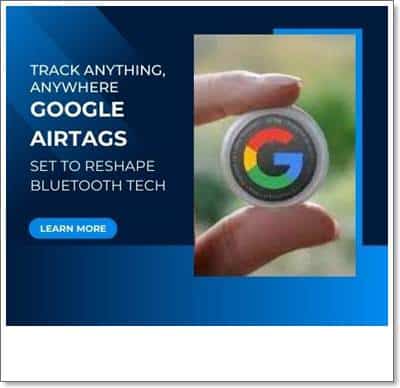
Introduction:
The tech sphere is buzzing with excitement as Google preps its answer to Apple’s AirTags – the rumored Google AirTags. In this exploration, we delve into the potential of these trackers and why they could reshape the world of Bluetooth tracking as we know it.
The Rivalry Unveiled:
For quite some time, whispers of a Google response to Apple’s AirTag have circulated. Recent developments, including the announcement of the Android Find My Device network, suggest that Google is gearing up to enter the Bluetooth tracking arena. This move aligns with the company’s extensive Android user base, potentially transforming billions of Android devices into a global tracking network.
The Grogu Connection:
Rumors suggest that the Google AirTag, possibly codenamed Grogu, could debut as the Nest Locator Tag. Whether it’s Grogu or Nest, Android users might soon have a robust alternative to existing trackers like Tile Pro and Samsung Galaxy SmartTag2. The prospect of a widespread object-finding network is particularly intriguing, as Google aims to create a network open to third-party manufacturers.
Release Date Speculations:
While Google hasn’t officially announced the AirTag rivals, credible leaks from sources like Kuba Wojciechowski hint at a potential reveal at Google I/O 2023. Although the initial plan was a summer 2023 launch for the Android Find My Device network, delays linked to Apple’s iOS updates pushed the timeline. Google aims to finalize its joint tracker specification with Apple, with a potential launch by the end of 2023.
Pricing and Competition:
As for pricing, no leaks have surfaced yet. Comparing with existing options like Apple AirTags, Samsung Galaxy SmartTag2, and Tile Pro, Google’s entry might fall within a similar range. The competitive Android ‘Finder Network’ could influence pricing dynamics and foster a more competitive market.
Technological Marvels:
The technology behind Google’s AirTag-style device mirrors Apple’s, featuring both UWB (Ultra-wideband) and Bluetooth Low Energy connectivity. Leaks indicate that Google’s tracker, in development by the Nest team, might boast a Nest Locator Tag branding. With UWB support, Android users might need recent Pixel phones, aligning with the Pixel 6 Pro, Pixel 7 Pro, and Pixel 8 Pro’s UWB compatibility.
The Find My Device Network:
The game-changer in Google’s strategy is the proposed Find My Device network. Anticipated to harness the power of over three billion active Android devices globally, this network could outscale Apple’s ‘Find My’ network. While Google has introduced features like encrypted last-known-location reports and tracker detection, the true potential will unfold when the network launches, offering a secure and expansive solution for tracking belongings.
Early Thoughts on Superiority:
In the quest for Bluetooth tracking dominance, Google’s AirTags stand out as a potential Android moment. The combination of advanced UWB technology, an open ‘Find My Device network,’ and compatibility with third-party manufacturers sets the stage for a groundbreaking release. The fragmented state of current Bluetooth trackers could witness a transformative shift, especially if Google’s offering is as powerful as anticipated.
Conclusion:
As we await official announcements, the prospect of Google AirTags introduces an exciting chapter in the world of Bluetooth tracking. The convergence of cutting-edge technology and a vast Android user network hints at a potential game-changer. Stay tuned for further updates on this innovative venture that could redefine how we track and locate our valuables.
Leave a Reply
You must be logged in to post a comment.